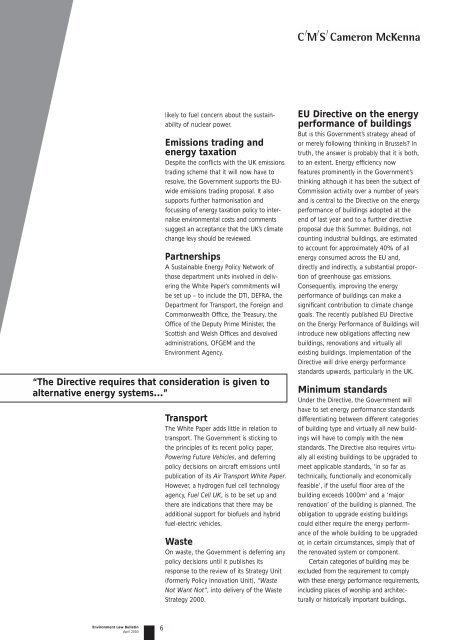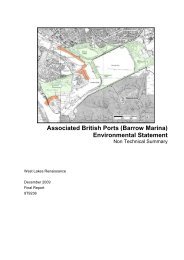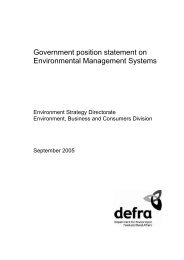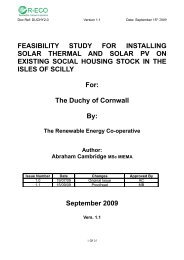likely to fuel concern about the sustainability<strong>of</strong> nuclear power.Emissions trading andenergy taxationDespite the conflicts with the UK emissionstrading scheme that it will now have toresolve, the Government supports the EUwideemissions trading proposal. It alsosupports further harmonisation andfocussing <strong>of</strong> energy taxation policy to internaliseenvironmental costs and commentssuggest an acceptance that the UK’s climatechange levy should be reviewed.PartnershipsA Sustainable Energy Policy Network <strong>of</strong>those department units involved in deliveringthe White Paper’s commitments willbe set up – to include the DTI, DEFRA, theDepartment for Transport, the Foreign andCommonwealth Office, the Treasury, theOffice <strong>of</strong> the Deputy Prime Minister, theScottish and Welsh Offices and devolvedadministrations, OFGEM and the<strong>Environment</strong> Agency.“The Directive requires that consideration is given toalternative energy systems…”TransportThe White Paper adds little in relation totransport. The Government is sticking tothe principles <strong>of</strong> its recent policy paper,Powering Future Vehicles, and deferringpolicy decisions on aircraft emissions untilpublication <strong>of</strong> its Air Transport White Paper.However, a hydrogen fuel cell technologyagency, Fuel Cell UK, is to be set up andthere are indications that there may beadditional support for bi<strong>of</strong>uels and hybridfuel-electric vehicles.WasteOn waste, the Government is deferring anypolicy decisions until it publishes itsresponse to the review <strong>of</strong> its Strategy Unit(formerly Policy Innovation Unit), “WasteNot Want Not”, into delivery <strong>of</strong> the WasteStrategy 2000.EU Directive on the energyperformance <strong>of</strong> buildingsBut is this Government’s strategy ahead <strong>of</strong>or merely following thinking in Brussels? Intruth, the answer is probably that it is both,to an extent. Energy efficiency nowfeatures prominently in the Government’sthinking although it has been the subject <strong>of</strong>Commission activity over a number <strong>of</strong> yearsand is central to the Directive on the energyperformance <strong>of</strong> buildings adopted at theend <strong>of</strong> last year and to a further directiveproposal due this Summer. Buildings, notcounting industrial buildings, are estimatedto account for approximately 40% <strong>of</strong> allenergy consumed across the EU and,directly and indirectly, a substantial proportion<strong>of</strong> greenhouse gas emissions.Consequently, improving the energyperformance <strong>of</strong> buildings can make asignificant contribution to climate changegoals. The recently published EU Directiveon the Energy Performance <strong>of</strong> Buildings willintroduce new obligations affecting newbuildings, renovations and virtually allexisting buildings. Implementation <strong>of</strong> theDirective will drive energy performancestandards upwards, particularly in the UK.Minimum standardsUnder the Directive, the Government willhave to set energy performance standardsdifferentiating between different categories<strong>of</strong> building type and virtually all new buildingswill have to comply with the newstandards. The Directive also requires virtuallyall existing buildings to be upgraded tomeet applicable standards, ‘in so far astechnically, functionally and economicallyfeasible’, if the useful floor area <strong>of</strong> thebuilding exceeds 1000m 2 and a ‘majorrenovation’ <strong>of</strong> the building is planned. Theobligation to upgrade existing buildingscould either require the energy performance<strong>of</strong> the whole building to be upgradedor, in certain circumstances, simply that <strong>of</strong>the renovated system or component.Certain categories <strong>of</strong> building may beexcluded from the requirement to complywith these energy performance requirements,including places <strong>of</strong> worship and architecturallyor historically important buildings.<strong>Environment</strong> <strong>Law</strong> <strong>Bulletin</strong>April 20036
Alternative energy sourcesThe Directive requires that consideration isgiven to alternative energy systems, such as: renewable energy technologies (forexample, solar electric ro<strong>of</strong> tiles or wallcladding); combined heat and power plant (boilersthat generate both heat and electricity); district or block heating and/or coolingschemes (a central source providingheating and/or cooling to a number <strong>of</strong>building or occupational units); and heat pumps (for example, pumpsextracting heat from the ground orresidual heat from used air or water).Where a new building is to have a usefulfloor area <strong>of</strong> more than 1000m 2 , the ‘technical,environmental and economicfeasibility’ <strong>of</strong> incorporating such alternativeenergy systems will have to be consideredand taken into account before the construction<strong>of</strong> the building starts. Buildingscurrently in the pipeline, where constructionis not due to start until after January 2006,will have to comply with this obligation.In the England and Wales, much can bedone to implement this requirement byamendment <strong>of</strong> the Building Regulations.Some <strong>of</strong> the systems, however, will requireconsideration that falls outside the currentscope <strong>of</strong> the Building Regulations andwhich may require consideration under theplanning system. A consultation draft revision<strong>of</strong> the planning policy guidance noteon renewable energy (PPG22) is due shortlyalthough the alternative energy systemsrequirement <strong>of</strong> the Directive may requireseparate regulations or incorporation intogeneral development orders to ensureappropriate consideration is given in alldevelopments required under the Directive.The Government promises, in its EnergyWhite Paper, to urge regional developmentbodies and local authorities to developrenewable energy and energy efficiencystrategies and targets. In sum, the alternativeenergy systems obligation could meanhaving to justify to the planning authorityany decision not to include such measuresin a building’s design and, if the feasibility<strong>of</strong> such measures is not considered in thedecision to grant a building planningpermission, the permission itself may beopen to challenge by judicial review.Energy certificatesIn England and Wales, energy performancecertificates are already required under theBuilding Regulations in respect <strong>of</strong> newbuildings. The Directive extends the certificationconcept to the regular energycertification <strong>of</strong> virtually all new and allexisting buildings. Only limited categories<strong>of</strong> buildings (as mentioned above) may beexcluded from this requirement.A valid certificate <strong>of</strong> energy performancewill have to be shown to the owner by thedeveloper on construction <strong>of</strong> any newbuilding, and by the owner to any prospectivepurchaser or tenant on the construction, saleor letting <strong>of</strong> any new or existing building. Thecertificate will have to be no more than 10years old, although wary purchasers andtenants are likely to ask for certificates thatare not just technically valid but also recent.A certificate will include an assessment <strong>of</strong>a building’s energy performance and acomparison with the performance <strong>of</strong> anequivalent new building or similar benchmark.Each certificate will also include anyrecommendations for cost-effective measuresto improve the building’s energy performance.Whilst these recommendations are notintended to be binding, they are likely to leadto a de facto obligation to implement therecommendations in at least two scenarios: where a prospective purchaser or tenantwith a strong negotiating position isable to demand that recommendedenergy performance improvements arecarried out to bring the building closerinto line with then current legal standardsor industry benchmarks; and where major renovation is undertaken<strong>of</strong> a building with a useful floor areaover 1000m 2 , it will be difficult to arguethat the upgrading requirement doesnot include recommendations on thecertificate which effectively amount toan expert assessment that the specifiedmeasures are technically, functionallyand economically feasible.As a result <strong>of</strong> mandatory energy performancedisclosure in virtually every property transaction,energy performance is likely to gain amuch higher priority than it currently enjoys.“The Directive extends the certification concept to theregular energy certification <strong>of</strong> virtually all new andall existing buildings.”All other factors being equal, prospectivepurchasers and tenants are likely to choosebuildings with good energy performance overthose with poor performance. Alternatively,faced with buildings that do not matchcurrent benchmarks and that may requireupgrading if any renovation work is undertaken,they are more likely to use poor energyperformance as a bargaining chip to negotiatepurchase prices and rents downwards. Inthe UK, in conjunction with sweeteners thatalready exist for the property industry in theform <strong>of</strong> tax incentives, capital grants and thepossibility <strong>of</strong> generating ‘credits’ to sell intothe UK emissions trading scheme, the overalleffect <strong>of</strong> the Directive should be positive.Interestingly, in its Energy White Paper,the UK Government commits to raising thebuilding energy performance requirements<strong>of</strong> the Building Regulations 2000 during thecourse <strong>of</strong> 2005. Meanwhile, the UK isbound to implement the Directive by 4 thJanuary 2006, and for England and Walesthis will require amendment <strong>of</strong> the BuildingRegulations. Therefore, it will be interestingto see if the Government’s policy commitmentwill result in energy performancestandards being set that are comparablewith those <strong>of</strong> our northern European neighboursand whether any other measures willbe introduced that go beyond the requirements<strong>of</strong> the Directive.Tom Bainbridge - Senior Assistant Solicitor<strong>Environment</strong> <strong>Law</strong> GroupCMS Cameron McKenna7<strong>Environment</strong> <strong>Law</strong> <strong>Bulletin</strong>April 2003
















